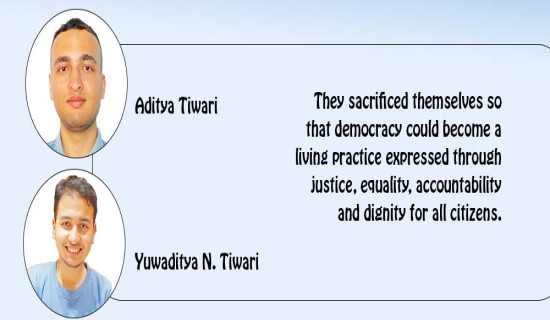- Saturday, 31 January 2026
Need For Digital Detox
Sugam Gautam
Before the advent of advanced technological devices, all activities were carried out through physical presence and required physical effort. The evolution of electronic devices like mobile phones, TVs, laptops, and refrigerators has eased our lives, changing the way how we perform tasks and consume information. If there were no internet today, people would have to spend considerable time on even minor tasks. Thanks to smart devices and the internet, people have optimised their time through their effective usage. However, it is noticed that many people, especially teenagers, spend most of their time in front of digital screens.
Digital devices have, of course, become an integral part of human lives, and almost every task we perform somehow requires a digital platform. For instance, it’s not possible for students to study without using laptops and the internet. In today’s world, every office is equipped with electronic devices, and one is bound to use them whether they want to or not. In this fast-growing world, it’s impossible to stay relevant without using digital devices, so it has become imperative to use these devices in a way that benefits you overall.
There’s no doubt that the digital revolution has left a positive mark on human civilization. But the grass is not necessarily greener on the other side. In our bid to ease our lives through mobile phones and the internet, we often get lost in the whirlpool of information and content available online.
Suppose there’s a task that requires five minutes; we complete it and then jump to another app on the phone, and it is hours before we put the phone aside. A wide range of apps on the phone becomes inescapable, tempting people to check them every once in a while.
Even though we use digital devices for valid purposes, there’s a high chance that we might end up using them for more time than is really necessary. Studies have shown that excessive use of digital screens impacts our mental health, increasing the risk of severe mental disorders. It not only affects our mental health but also disturbs our sleep and overall quality of life.
These days, people have become so addicted to their phones that they use them in bed before sleeping and check them first thing in the morning. Using a mobile phone in bed reduces the amount of sleep. When one is deprived of sleep, they are highly unlikely to function vigorously as their mood remains peevish and their body lazy.
Apart from mental health, the excessive use of digital screens also takes a toll on physical health, causing eye strain, blurry vision, dry eyes, and neck pain, among other issues. While it has become crucial to use digital devices in this tech-savvy world, it has become equally indispensable to utilise them without welcoming unhealthy consequences.
This is where the concept of a digital detox comes in. A digital detox means avoiding digital screens as much as possible for a certain period.
By avoiding, it doesn’t mean that one must completely cut off the virtual world. One can reduce the amount of time spent online and reflect on other aspects of life. The balance between the physical world and the virtual world is essential for the well-being of every individual.
















